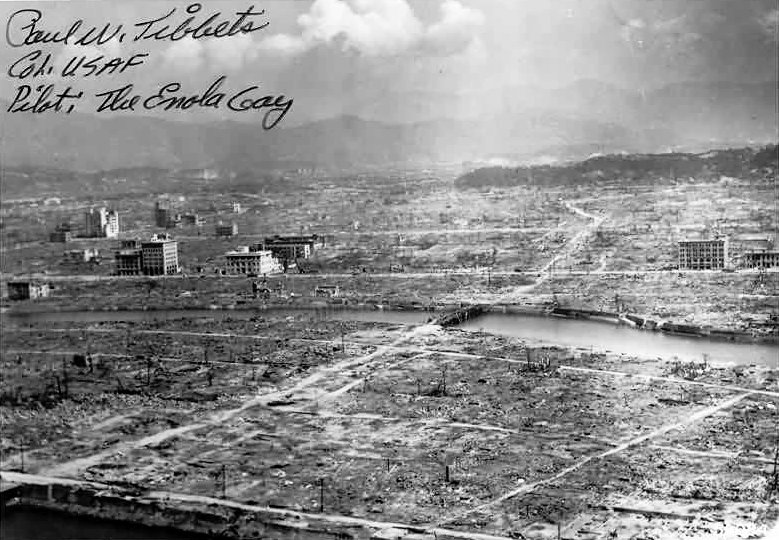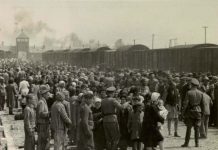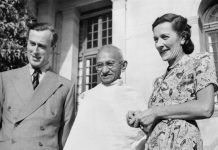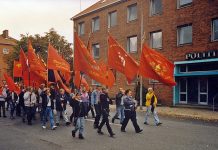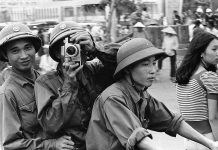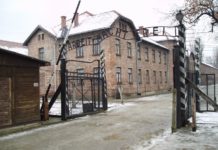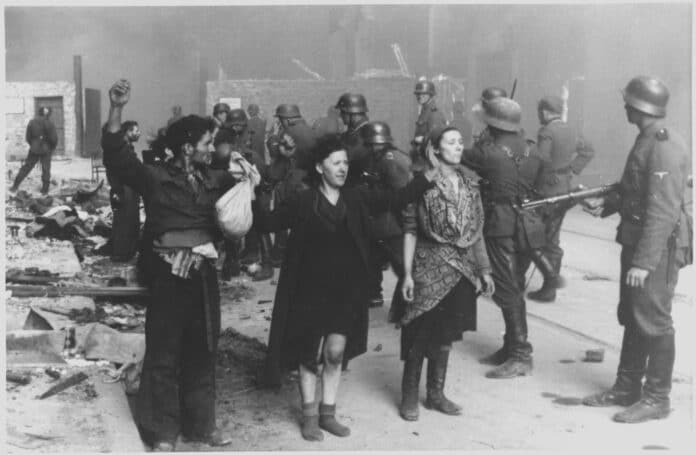
Emneliste med leksikale artikler og analyser + materiale fra Tidslinjen om 2. Verdenskrig, begyndelse, begivenheder og afslutning på krigen.
(Tidsskriftcentret, august 2009)
Forord
1. september 1939 startede det tyske felttog mod Polen den Anden Verdenskrig.
Emnet er så omfattende, at denne linkbox er forsøgt begrænset til generelle artikler om verdenskrigen, tidslinjer mv.
Links til enkelte vigtige begivenheder og følger af krigen skal findes på Tidslinjen (se henvisninger forneden).
Se også fra Socialistisk Bibliotek:
- Emnelisten: Besættelsen 1940-45 – og modstanden
- Linkboxen: Nazi-Tyskland 1933-1945
- Emneliste: Auschwitz og holocaust
Vi har delt links op sprogligt i skandinaviske og engelsksprogede.
Indhold:
- Leksika / Encyclopedias
- Artikler/bøger (dansk nordisk-sprogede)
- Articles (in English)
- Tidslinjen / Timeline
- Se også / See also
- Appendix: Revolutionære og 2. verdenskrig
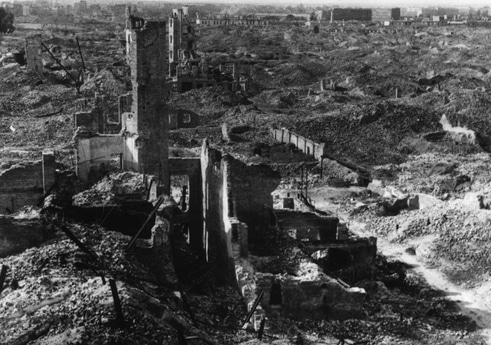
Leksika mv.
- 2. Verdenskrig (Denstoredanske.dk)
- Underemnerne på Denstoredanske.dk
- Anden verdenskrig (Leksikon.org)
- 2. verdenskrig (Wikipedia.dk)
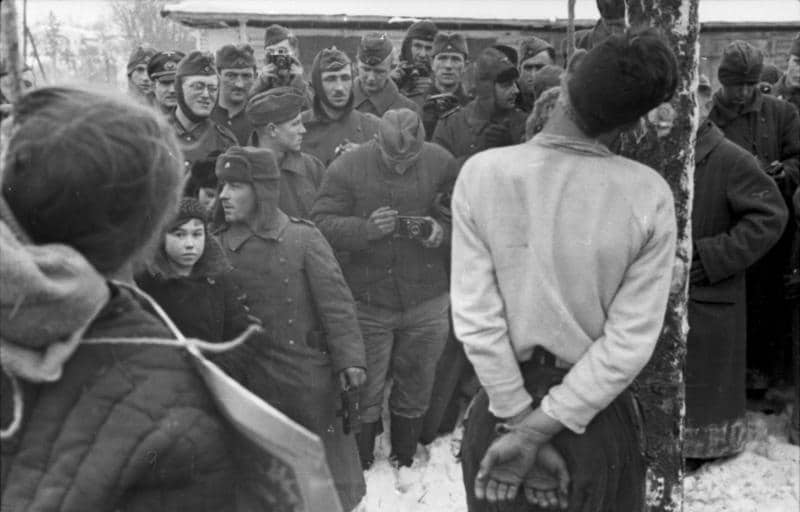
På engelsk/in English:
- Second World War Encyclopaedia (Spartacus Educational)
- World War II (Wikipedia.org)
- Timeline of World War II (Wikipedia.org)
- Timeline with Photos and Text (The History Place; World War II in Europe)
- World War II: reading guide (Libcom.org). “Reading guide about the Second World War, Nazism, resistance movements and class struggle during the war.” With: Key texts, Battle of France, Germany’s war, Nazi Extermination Programmes, UK and US strategies and atrocities, resistance movements and groups, Workers’ struggles during and immediately after the war.
.
Tidsskriftsartikler/bøger online mv. på dansk/nordisk:
2 Verdenskrig – en imperialistisk krig. Af Freddie Nielsen (Socialistisk Arbejderavis, nr. 395, 22. august 2022, s.7)
“Referencerne til 2. verdenskrig, i forbindelse med Ruslands angreb på Ukraine, formidler et billede af ‘den gode krig’, som gjorde op med nazismen … er kampen mod Nazismen hele sandheden om 2 verdenskrig?”
Myten om Stalin og anden verdenskrig. Af Kalle Kühlmann (Marxisme, nr.1, efterår 2019, s.23-30; online på Marxist.dk)
“Alle generationer har siden anden verdenskrig stået i taknemmelighedsgæld til Sovjetunionen for sejren over fascismen. Men Stalin skal ingen andel have af den taknemlighed [til] den sovjetiske planøkonomis præstationer og ikke mindst det sovjetiske folks kamp for en bedre verden.”
Hvem vandt 2. Verdenskrig? Af Curt Sørensen (Modkraft.dk/Blog, 3. maj 2015)
“2. verdenskrig i Europa blev først og fremmest udkæmpet på Østfronten. Udfaldet her, og hermed krigens udfald i Europa, var primært bestemt af udviklingen i styrkeforholdet mellem de to magter, Tyskland og Sovjetunionen. Uden Sovjetunionens krigsindsats havde Nazi-Tyskland vundet den europæiske krig. Det har man dog stort set fortrængt i dag.”
Nazi-rigets sidste dage. Af Alfred Lang (Modkraft.dk/Kontradoxa, 23. marts 2005). Se ajourført udgave: For 70 år siden – nazirigets undergang (Autonom Infoservice, 2. maj 2015). Med tillæg: ‘Hvem var hvem i nazisternes hierarki?’
60-året for D-dag: Sandheden om anden verdenskrig, 1. del, + 2. del. Af Alan Woods (Revolution, 5. august + 14. august 2004; 1. del online på In Defence of Marxism)
USA og Anden Verdenskrig. Af Angela Klein (Socialistisk Information, nr. 177, juni 2003). “Den retfærdige krig eller hvorfor den tyske arbejderbevægelse ikke har grund til at takke amerikanerne.”
Trotskisterne og modstandskampen under Anden Verdenskrig (Socialistisk Information, 6. februar 2023). “I 1976 arrangerede International Marxist Group et seminar om Fjerde Internationales historie i London, hvor Ernest Mandel holdt oplæg. Den følgende tekst er et uddrag heraf.”
Texter om Andra världskriget (Marxistarkiv.se). Se her bl.a. Ernest Mandel: Andra världskriget: Vad det egentligen handlade om (pdf) (Bokförlaget Röda Rummet, 2005, 292 sider). Også online på Marxists Internet Archive, Svenska arkivet.
tema: Anden Verdenskrig (Socialister.dk) by Marnie Holborow: Book Review:
Donny Gluckstein: “A People’s History of the Second World War” & debate by John Molyneux & John Newsinger et al.
På engelsk
Fighting on all Fronts. By Martin Empson (Socialist Review, Issue 404, July/August 2015). Review of Donny Gluckstein, Fighting on all Fronts: Popular Resistance in the Second World War (Bookmarks, 2015, 348 p.)
“[The book] brings together examples from around the globe. The result is an illuminating book in which different authors highlight forgotten history.” See also review by Marnie Holborow: War from above, resistance from below (International Socialism, Issue 151, Summer 2016, p.196-199)
A Marxist history of the Second World War. By Peter Stauber (Counterfire, October 29, 2014). Review of Chris Bambery, The Second World War: A Marxist History (Pluto Press, 2014, 295 p.)
“Chris Bambery’s account of World War II shows how imperialist schemes and interests meant that it was far from a simple story of a heroic struggle against fascism.”
A People’s History of the Second World War. By John Molyneux (Irish Marxist Review, Vol.1, No.4, 2012, p.89-98). Review of Donny Gluckstein’s book (Pluto Press, 2012, 269 p.)
“Donny Gluckstein has produced a fascinating and important Marxist analysis of
the Second World War. As one might expect the starting point of the book is a
critique of the dominant, ie ruling class, narrative of the War as an almost uniquely ‘good’ war waged by the Allies for freedom and democracy against the unspeakably evil Nazi regime and its allies.” See also interview with Donny Gluckstein: World War II: the dual struggle (New Left Project, 29 May 2012; online at Internet Archive).
Exploding the myth of the ‘People’s War’. By Neil Davenport (Spiked Online: Spiked Review of Books, No.61, October 2012). Review of James Heartfield, Unpatriotic History of the Second World War (Zero Books, 2012, 556 p.)
“James Heartfield demolishes the dominant anti-fascist narrative to reveal the truth about the Second World War: six years of slaughter, poverty and exploitation.” See the book online at Libcom.org/Internet Archive (pdf).
The Second World War: resistance. Part 90 in Neil Faulkner: A Marxist History of the World (Counterfire, 27 August 2012)
“Large parts of Occupied Europe were liberated by local resistance movements. But the potential for a revolutionary transformation was smothered at birth.”
Trotskyists and the Resistance in World War Two. By Ernest Mandel (Marxist’s Internet Archive). From the transcript of a talk in London in 1976.
1941-1945: barbarism in a world gone mad. Part 89 in Neil Faulkner: A Marxist History of the World (Counterfire, 19 August 2012)
“The Second World War was characterised by primeval savagery. Nazi Germany, Stalinist Russia and Militarist Japan waged war with unprecedented brutality, but the ‘democracies’ also committed terrible war crimes.” The Second World War. Part 88 in Neil Faulkner: A Marxist History of the World (Counterfire, 12 August 2012)
“With the great powers fighting to defend their empires, the Second World War would re-divide the world between competing blocs of capitalists.” The causes of the Second World War. Part 87 in Neil Faulkner: A Marxist History of the World (Counterfire, 5 August 2012)
“As Hitler sought to expand Germany’s sphere of influence in Europe, Britain’s policy of appeasement reflected the interests of the British ruling classes – until German power became overwhelming.”
World War as class war. By James Heartfield (Mute Magazine, Vol.2, No.14, 2010)
“Looking through the mists of obligatory sentimentalism that enveloped the 70th aniversary of the outbreak of WWII, James Heartfield remembers the pitiless subordination of people to production on all sides of that crisis.”
Seventy years since the outbreak of World War II: Causes, consequences and lessons. By David North (World Socialist Web Site, 29 October 2009)
“The main concern of this lecture is not the specific conflicts and events that triggered World War II, but rather the war’s more general causes.”
Outbreak of the Second World War: Who were the ‘guilty men’? By Chris Bambery (Socialist Worker, Issue 2167, 1 September 2009)
“… examines the role of the British establishment in appeasing Hitler.”
Seventy years since the beginning of World War II. By Nick Beams (World Socialist Web Site, 3 September 2009)
“Contrary to the prevailing myths, this was not a war of democracy versus fascism, any more than World War I was a ‘war to end all wars’. It was an imperialist war waged by the capitalist great powers – ‘democratic’ and fascist alike – for the division of the world and its resources in the interests of profit.”
Marxism and the second world war. By Peter Taaffe (Socialism Today, Issue 131, September 2009)
“Seventy years ago, the major powers plunged humanity into the horror of world war. Modern capitalist technique guaranteed death and destruction on a previously unimaginable scale. Despite the contending claims this was, at root, a struggle for markets, and economic and political dominance.”
Holocaust: The ignored reality. By Timothy Snyder (The New York Review of Books, Vol.56, No.12, July 16, 2009)
“The geographic, moral, and political center of the Europe of mass killing is the Europe of the East, above all Belarus, Ukraine, Poland, and the Baltic States, lands that were subject to sustained policies of atrocity by both regimes.”
Second World War: The battle of the books (Spiked, 9 May 2005)
“James Heartfield surveys the struggle to define the Second World War.”
The War in Europe: What really happened? (Libcom.org, 2005/2011; online at Internet Archive)
“James Heartfield looks back at the events of the second world war in Europe, concluding that the motivation of the allied powers was not to save Europe from fascism or the Jews from genocide, but to protect their economic interests.”
Plumbing the depths: Marxism and the Holocaust. By Alex Callinicos (The Yale Journal of Criticism, Vol. 14, No.2, 2001, p.385-414; online at Marxisme Online)
“The primacy of Nazi ideology in the development of the Holocaust is critical to understanding that, even if even if economic pressures – for example, food shortages in the occupied USSR – may have helped motivate particular murder campaigns, the extermination of the Jews cannot be explained in economic terms.”
A band of brothers? By Michael Bradley (International Socialism, Issue 103, Summer 2004, page 95-113)
“Sixty years after D-day Michael Bradley takes us through the day’s event and argues that it wasn’t the pivotal moment we are told about at school. He looks at the British Communist Party’s role in galvanising working class support for the war effort, but argues that the class war was far from over.”
World War II: The good war? By Ashley Smith (International Socialist Review, Issue 10, Winter 2000, p.53-60)
“Most people think of the Second World War as ‘the good war’ – a war against fascism and for democracy … But if you look seriously behind the myth at what really happened in the Second World War, it becomes clear that the U.S. has nothing to boast about.”
Was the Second World War a war for democracy? By Chris Bambery (International Socialism, Issue 67, Summer 1995, p.37-95)
“The 50th anniversary of VE day has raised many serious questions about how the ruling classes of Europe were prepared to collaborate with fascists and fought to carve out empires, not to protect democracy. The war ended in a massive eruption of working class radicalisation across Europe.”
A soldier’s story (Socialist Review, Issue 186, May 1995). “Duncan Hallas has been a lifelong Trotskyist who spent the war as an engineer’s apprentice in Manchester and then was conscripted into the army. Clare Fermont and Chris Nineham talked to him about his experiences.”
Se også på Tidslinjen
- 30. september 1938 om Münchenaftalen
- 23. august 1939 om Hitler/Stalin-pagten
- 22. juni 1941 om Tysklands angreb på Sovjetunionen
- 2. februar 1943 om Tysklands nederlag ved Stalingrad
- 19. april 1943 om opstanden i den jødiske ghetto i Warszawa
- 6. juni 1944 om invasionen i Normandiet (D-dag)
- 1. august 1944 om opstanden i Warschawa
- 15. august 1944 om befrielsen af Paris.
- 4. februar 1945 om Jalta-konferencen
- 13. februar 1945 om bombningen af den tyske by Dresden
- 6. august 1945 om atombombningen af Hiroshima og Nagasaki
- 20. november 1945 om krigsretssagerne i Nürnberg/on the Nüremberg Trials
Se også på Socialistisk Bibliotek
- Linkbox om Kommunistisk Internationale (Komintern)
- Linkbox om Første Verdenskrig /On the First World War, WW1
